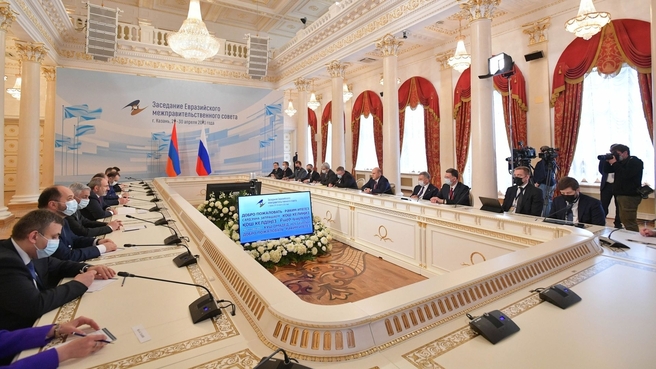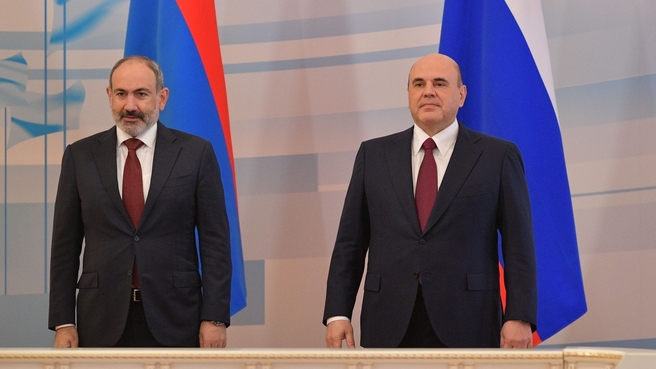The meeting took place on the sidelines of a Eurasian Intergovernmental Council meeting.
Excerpts from the transcript:
Mikhail Mishustin: Mr Pashinyan, colleagues, I am delighted to see you in the Russian Federation, in Kazan, the capital city of Tatarstan, for a meeting of the Eurasian Intergovernmental Council.
First of all, I would like to convey warms greetings and best regards from President of Russia Vladimir Putin.
We value our fraternal relations with Armenia, our allied and strategic relations that go back decades. Next year we will celebrate 30 years of our diplomatic relations and 25 years of the Treaty of Friendship and Cooperation with Armenia.
The measures which the leaders of Azerbaijan, Armenia and Russia adopted after the conclusion of hostilities in Nagorno-Karabakh on 9 November 2020 and 11 January 2021 offered broad opportunities for join activities. We should begin by unblocking all economic and transport communications and creating new infrastructure routes. This will create conditions for the sustainable development of the South Caucasus.
Visit
-
Restricted-attendance meeting of the Eurasian Intergovernmental Council
-
Mikhail Mishustin’s conversation with Prime Minister of the Kyrgyz Republic Ulukbek Maripov
-
Mikhail Mishustin’s conversation with Prime Minister of Uzbekistan Abdulla Aripov
-
Mikhail Mishustin’s conversation with Prime Minister of the Republic of Tajikistan Kohir Rasulzoda
-
Mikhail Mishustin’s conversation with Prime Minister of the Republic of Kazakhstan Askar Mamin
-
Mikhail Mishustin meets with Prime Minister of the Republic of Belarus Roman Golovchenko
-
Mikhail Mishustin’s meeting with President of Tatarstan Rustam Minnikhanov
Russia is helping. We are providing extensive humanitarian assistance. The Interdepartmental Humanitarian Response Centre is working to create conditions for the return of refugees to their homes and the subsequent restoration of the infrastructure.
Russia remains the leading partner of Armenia. Our joint companies are implementing ambitious economic projects. Regrettably, coronavirus had a negative effect on the dynamic of our bilateral trade: last year it declined by approximately 10 percent to some $2.3 billion. This definitely not good enough. I propose instructing our intergovernmental commission – the Russian co-chair is Alexei Overchuk, who you know very well – to prepare new initiatives to increase trade and mutual investment with Armenia.
We are also working together energetically to put an end to the COVID-19 pandemic. We have sent test kits and reagents to Armenia, and now we are sending supplies of the Sputnik V vaccine.
I would like to thank you for using the Travelling without COVID-19 mobile application, created by the Eurasian Development Bank, for trips by Armenian citizens to Russia. This is a very positive trend. After all, we are simplifying the travel procedure for our citizens to travel between our countries.
We are also working together energetically within the framework of the Eurasian Economic Union. The four freedoms – the free movement of goods, services, capital and workforce – are on our agenda. I am sure that the deepening of Eurasian integration is in the best interests of people and businesses in Russia and Armenia.
Mr Pashinyan, I am ready to discuss the relevant current issues, including our bilateral agenda, with you. Please, go ahead.
Nikol Pashinyan: Thank you very much, Mr Mishustin. Mr Minnikhanov, colleagues,
I am very glad to meet with you today. This is my first time in Tatarstan. We all know that this is one of the most significant and developed regions of Russia.
I am sure that effective decisions will be made and meaningful discussions will take place during our talks and today’s meeting of the EAEU Intergovernmental Council.
As you have already said, our bilateral relations are making good, steady progress. The strategic relationship between the Russian Federation and Armenia is deepening. It is easy to see that our bilateral relations have intensified, and this is a very good factor for the stability of our region.
I would like to especially note the role that Russia and Russian President Vladimir Putin played in ending the war in Nagorno-Karabakh. I want to emphasise that I see the Russian peacekeepers’ activities in Nagorno-Karabakh as effective. It is already obvious to us now.
You rightly noted that our trilateral commission headed by the deputy prime ministers of the Russian Federation, Armenia and Azerbaijan is working. We have a very constructive attitude in this regard. But I want to note that, unfortunately, Azerbaijan has not yet fulfilled a very important article of the 9 November trilateral Statement by the President of Russia, the Prime Minister of Armenia and the President of Azerbaijan. This concerns the return of prisoners of war, hostages and other detainees. I would like to thank the Russian Federation for the effort it is putting in to resolve this issue.
We highly appreciate the work of the Trilateral Commission because the creation of regional links can change the entire economic situation in our region and strengthen economic ties and integration between the Russian Federation and Armenia. In this regard, I would like to note the important and constructive role played by Deputy Prime Minister of Russia Alexey Overchuk. We highly appreciate his work and hope it will lead to tangible results. Everyone understands that this is important not only for our region, but also for the region in a broader sense, because it is about restoring ties between the Persian Gulf and the Black Sea, and between the Persian Gulf and the Russian Federation. Moreover, this can become a powerful economic factor for the development of the Eurasian Economic Union. And once again, I would like to emphasise our constructive approach and hope the work being done now will lead to concrete results and will bring stability, peace and prosperity to our entire region.











